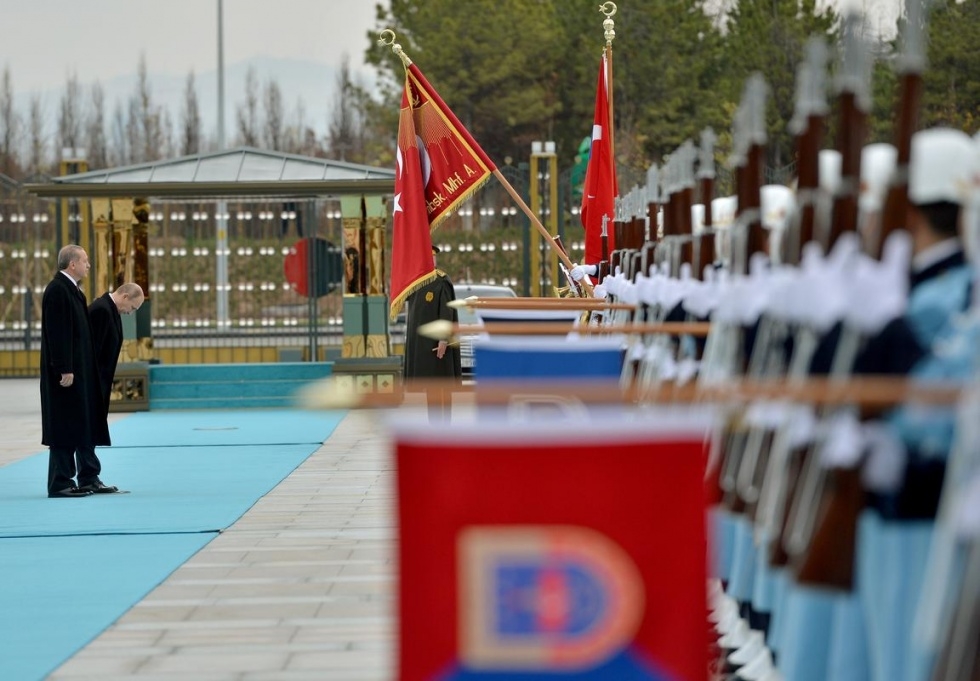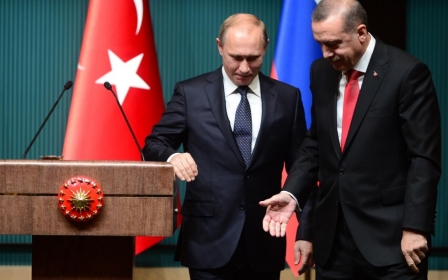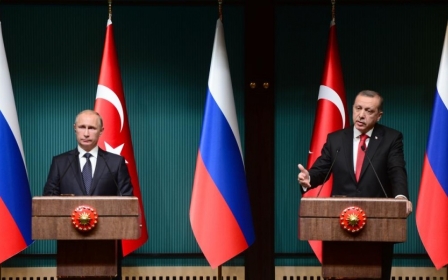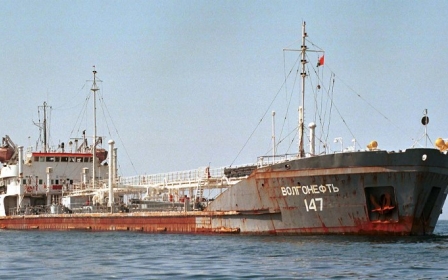Turkey plays complex energy game

Over the past few days, developments revolving around the Near East’s energy chess game signal a substantial impact on the broader region.
Russian President Vladimir Putin's visit to Ankara and the unexpected decision to move the landfall of the South Stream natural gas pipeline project from Bulgaria to Turkey has several repercussions.
The move came after the European Union imposed crippling sanctions on Russia over the ongoing conflict in Ukraine. Russia's oil and gas sales amount to around 70 percent of its total exports. On top of sanctions, Russia is having to contend with large declines in the price of crude oil in the world market and is seeking ways to deal with an economy that is moving towards recession.
Meanwhile, the central government in Iraq has struck a deal with the autonomous Kurdish region in the north to allocate it 17 percent of the national budget in return for income from crude oil sales that amount to 550,000 barrels per day. Of that, 250,000 barrels are projected to be supplied to the world market through Turkey.
Redefinition of Turkey's geopolitics
A member of the North Atlantic Treaty Organisation since 1952, Turkey was one of the vanguard countries on the eastern front of the Western alliance to counter the Soviet Union threat. For many years, Turkey benefited from generous economic and military aid coming from the United States, while its security was guaranteed by the alliance. With the termination of the Cold War, Turkey's privileged status under the US' close care came to an end.
Along with the European Union's outreach to the former Soviet states in central and eastern Europe by the early 1990s, Turkey's aspiration to become a member of the union faded away. The EU's geographical prioritisation created in Turkey a sense of abandonment, forcing it to find new ways to revitalise its geopolitical importance.
Understanding the potential opportunities and threats involved in the politics of energy in the 21st century, Turkey focused on how it could present itself as a potential crossroads of key energy routes. Lacking hydrocarbon resources in a region that has them in abundance, Turkey nevertheless sits at the crossing of the Middle East and the Caspian basin and so developed a policy to present itself as an energy link from those regions to Europe.
Over the past decade, Turkey has engaged in multinational deals to establish new energy routes from its near and more distant neighbours to Europe. By doing so, Turkey aimed to secure its own energy needs while contributing to the EU's energy policy framework, which prioritises a diversification of resources.
While large-scale projects like Nabucco and the Trans-Anatolian pipeline (TANAP) worked to this purpose, other projects have been presented that rival Turkey's ambitions.
The Nabucco project, which was intended to transport gas from the Caspian Sea to Europe via Turkey, avoiding Russia, was abandoned last year, while Russia pressed ahead with plans for the South Stream project, which would carry natural gas from Russia by pipeline under the Black Sea to Bulgaria and thence to Europe. This was well before Russia's military actions in Ukraine and subsequent sanctions.
The only remaining gas pipeline project left in Turkey is TANAP. At the first stage, it aims to bring natural gas from Azerbaijan to Europe, with possible extensions to carry gas from Turkmenistan and Iran (should the international community manage to solve ongoing nuclear issues with Tehran).
That still leaves Turkey placed to become the region’s biggest energy transit country and a major energy hub with a diversified range of suppliers, with the added potential of becoming a major exporter of liquefied natural gas (LNG) through facilities that it plans to construct.
The new energy game in the region
In this context, Putin's decision to divert the South Stream project to Turkey and away from Bulgaria took many by surprise, and was greeted in Turkey with joy. However, there is another side of the coin.
According to energy expert and former Turkish Petroleum Corporation manager Necdet Pamir, the move to bring the South Stream pipeline to Turkey would in fact have a negative consequence on Turkey's general energy policy framework.
"While the EU is working to diversify its energy imports to decrease its dependence on Russia, Turkey's deal with Russia would result in a more dependent relationship," he told MEE.
And not only for the EU. Turkey already buys around 58 percent of its natural gas, 32 percent of its coal and 8 percent of its oil from Russia. There is a huge trade deficit between the two countries in Russia's favour: Turkey’s imports from Russia amount to $25 billion out of $32 billion of bilateral trade volume. The two countries aim to increase the volume to $100 billion by 2023.
"When the projected trade volume goal is achieved, Turkey's deficit would become more dramatic as it increasingly relies on the Russian gas," Pamir said.
The EU has long sought to diversify its supplies of natural gas away from Russia, for which Ukraine serves as an important transit country as well as being dependent on Russian gas for its own needs.
The need for diversification was underlined by a 2006 row between Ukraine and Russia over the price of natural gas and Russia's subsequent cuts in supplies to Ukraine, cuts that also affected a number of countries in Europe.
For the energy expert Pamir, this situation, along with the sanctions on Russia, are not to Turkey's great benefit. "At a time when the EU is sanctioning Russia, there is no point for the Russian gas for sale to enter Turkey," he said.
Though Russia's cooperation with Turkey appears to be a defiant move by Putin to confront his European counterparts, some analysts do view it to be in Turkey's favour.
For Cem Deniz Kut, specialising on Turkey's energy politics at Istanbul Bilgi University, the recent developments should be analysed from a wider perspective. "It is for certain that Russia's choice of Turkey is a highly diplomatic move in conjuncture with its ongoing problems, but the deal perfectly fits with Turkey's general energy framework in the region," he told MEE.
The diversification of energy supply routes is of utmost importance for Turkey and, for Kut, Turkey's willingness to become a part of South Stream should also be considered as a fragment of a broader policy to gain political leverage in the region.
It is not surprising that Turkey's frozen accession negotiations with the EU feed the disillusionment in Ankara. "Turkey is on the verge of finding itself at the forefront of a 'new Cold War' that has been discussed for some time now, but the NATO member is much more integrated with both sides compared to the Cold War years. With its current policies, Turkey wants to re-establish its geostrategic importance as well as enjoy the potential leverages that the energy game brings to the table," Kut said.
Turkey has not joined with the EU and US sanctions on Russia, and so, with the help of Russia's dwindling imports from countries supporting the sanctions, it found itself as a major trading partner with the energy giant.
Turkey's developing economic relationship has not gone unnoticed, and NATO general secretary Jens Stoltenberg this month, in response to a question over Turkey’s increased trade with Russia, said he would “like to see as many countries as possible be part of this, to support the sanctions. It’s important that it has an effect.”
Habibe Ozdal, a researcher focusing on Russia-Turkey relations at Ankara-based think-tank USAK, saw the rapprochement of the two countries as an "axis of the excluded".
"We are now familiar with Turkey's similar moves to warn the EU when it feels confident with its foreign policy options," Ozdal told MEE. "However, considering Turkey's increasing reliance on Russian gas, the South Stream deal should not be seen as a warning from both Turkey and Russia to the EU, but rather a warning from Russia only."
At the end of the day, Turkey is a member of NATO and still an aspiring candidate member to the EU. Its relations with Russia are based on trade, and politics appear to come second to that as the leaders of both countries have radical differences over Ukraine and Syria.
For Kut, Turkey could benefit from the situation in the long run, but he warns that the aspiring transit country should be careful about its energy diversification policy and work on presenting itself as a reliable partner. "This is why the South Stream deal should not jeopardise TANAP and other potential deals," he said.
Pamir expressed the same line of thinking with a political warning: "As much as Turkey's name is being mentioned alongside Russia, it tarnishes its reputation. This leads to more exclusion and solitude, and the 'worth' of this 'solitude' remains to be seen."
New MEE newsletter: Jerusalem Dispatch
Sign up to get the latest insights and analysis on Israel-Palestine, alongside Turkey Unpacked and other MEE newsletters
Middle East Eye delivers independent and unrivalled coverage and analysis of the Middle East, North Africa and beyond. To learn more about republishing this content and the associated fees, please fill out this form. More about MEE can be found here.




